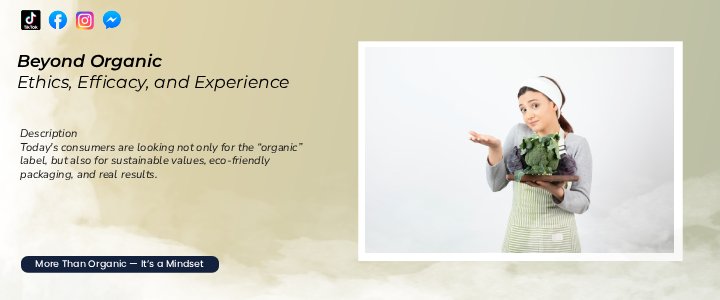The Shift in the Meaning of Organic
Organic once stood as the gold standard for conscious consumption. Today, however, consumers are increasingly looking not just for “organic” but for values that go deeper. Organic certification still matters, but shoppers also ask: Is the product sustainable? Was it ethically sourced? Is the supply chain transparent? These questions reflect a growing desire for products that align with both personal health and global responsibility.
This shift shows that the organic label is no longer enough on its own. Companies that want to build trust need to combine organic practices with broader commitments to the environment, workers, and communities.
Why “Organic” Is Not Enough
Broader Expectations from Conscious Consumers
The organic movement started with avoiding pesticides and harmful chemicals. Now, consumers expect more than clean ingredients. They want assurance that products:
- Minimize environmental impact
- Respect fair labor practices
- Use responsible packaging
- Support biodiversity
This evolution is driven by increased awareness of climate change, supply chain issues, and global inequities. Shoppers today connect their purchases with larger social and environmental outcomes.
Key Values Consumers Are Demanding
Consumers are layering expectations on top of organic standards. Let’s look at the core values shaping this trend.
Sustainability and Climate Responsibility
People want products that reduce waste and carbon footprints. Renewable energy use, regenerative farming, and recyclable packaging are now part of consumer checklists.
Ethical and Fair Sourcing
Consumers look beyond the farm to the people behind the product. They care whether farmers and workers are treated fairly and paid justly.
Transparency and Traceability
Shoppers want to know exactly where their food, cosmetics, or clothing comes from. Brands that openly share sourcing and production details often win greater trust.
Minimal and Clean Processing
Even if a product is organic, heavy processing can make it less appealing. Consumers are seeking simple, minimally altered products that retain natural integrity.
A Comparison of Priorities
To illustrate how consumer expectations have expanded, here’s a simple table:
| Traditional Focus | Modern Consumer Focus |
|---|---|
| Organic certification | Organic + sustainable practices |
| No pesticides | No pesticides + ethical labor |
| Health benefits | Health + environmental responsibility |
| Natural ingredients | Natural + transparent sourcing |
This comparison highlights how organic remains important but now functions as a starting point, not the end goal.
What This Means for Brands
For brands, relying solely on the word “organic” no longer guarantees loyalty. To stay relevant, they must:
- Communicate openly about sourcing and production
- Invest in ethical supply chains
- Adopt circular or low-waste models
- Demonstrate measurable climate commitments
Brands that address these broader values often find stronger connections with conscious buyers, who are not just shopping but also supporting a cause.
Conclusion
Organic is still powerful, but consumers are increasingly looking not just for “organic.” They want products that reflect sustainability, ethics, transparency, and responsibility. This new era of conscious consumption challenges businesses to rise above minimum certifications and embrace holistic integrity.
For consumers, it’s an opportunity to align purchases with values. For brands, it’s a chance to lead in building a healthier, fairer, and more sustainable world.



